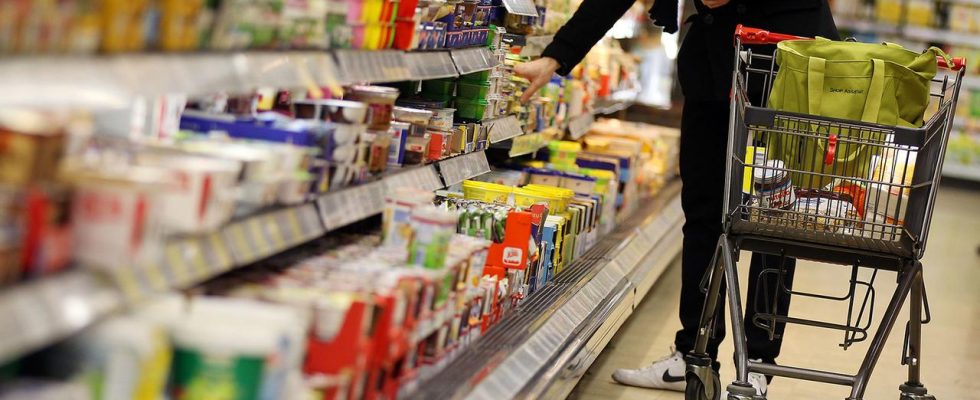Discontent in the supermarket: First the prices rose, then the pack sizes shrank – and now the quality is also falling. Inflation and shrinkflation are joined by skimpflation.
High costs for energy, raw materials, employees, interrupted supply chains – consumers notice that companies pass these costs on to consumers, especially in supermarkets and gas stations. But in many cases it wasn’t just prices that rose.
Packaging has also often become smaller. The Hamburg consumer advice center named the margarine Rama from the manufacturer Upfield the “deceptive package of the year 2022”. The product shrank from 500 to 400 grams at a price of 2.19 euros. So it became 25 percent more expensive. This phenomenon became known as “shrinkflation.”
Now the quality also suffers
Inflation is no longer at record high levels, but a new trend is emerging in supermarkets: “skimpflation”. The English “skimp” means “to skimp”, “to save” and means: Manufacturers not only increase prices, but also reduce the quality of products. The term was coined by the US TV channel NPR in 2021. “The phenomenon is also spreading in Great Britain and Germany,” reports Sabine Hübner, service expert and author tagesschau.de.
After the start of the Ukraine war in 2022, manufacturers of French fries replaced sunflower oil with palm fat because the oil was no longer available. “What was intended as an emergency solution has partly become established,” explains Hübner. Although sunflower oil has long since become sufficiently available again, according to them, only one of the manufacturers examined has returned to the higher quality product.
Modified ingredients not reported
It is particularly precarious that some manufacturers have not shown the change on the packaging. The nutritional values no longer matched the original information. In addition, palm fat is unhealthier than sunflower oil due to its higher proportion of saturated fatty acids.
The reason, according to Hübner: Since new packaging was not available, the companies received an exemption. Instead of in the list of ingredients, the manufacturers simply had to print the note “contains palm oil instead of sunflower oil” in the field for the best-before date. However, this went unnoticed by many consumers.
Unfortunately not an isolated case
Skimpflation often occurs with food, explains Hübner. The Hamburg consumer advice center shares this experience. She reports, for example, that the quality of chocolate available at Aldi Nord has deteriorated at a higher price:
“For the Chocolat Amandes Edel Marzipan whole milk and Chocolat Amandes Edel Marzipan dark varieties, only 38 percent of fine marzipan is now used per chocolate bar; previously it was 45 percent,” complain the consumer advocates. The proportion of pistachio marzipan and nougat has also fallen in the Chocolat Amandes Marzipan variety. The two varieties were tasted at the same time 1.49 € now 1.69 euros.
There are also savings on service
But skimpflation also means less service. “The labor shortage is noticeable here,” says expert Hübner. And that brings restrictions for customers: long waiting times at hotlines, fewer bank branches and longer routes to the next one, long queues at airports due to fewer security staff; Hotels that no longer clean their rooms every day, airlines that allow less hand luggage while ticket prices are rising at the same time. In restaurants, fewer service employees serve waiting guests, and in supermarkets there are queues in front of the checkouts. “This means that customers receive less service, and at the same time employees often have to work more.”
It is objectively understandable that companies are trying to pass on increased costs and compensate for staff shortages, says Hübner. Saving employees in order to maximize profits at the expense of customers or guests is too short-sighted. “It’s presumptuous to believe that people don’t notice this. Anyone who feels cheated will turn away from the company or the brand.”
Skimpflation on products is difficult to understand
In principle, however, there is more understanding among customers when it comes to service, says Hübner. “The staff shortage is well known; many people feel this in their own companies.” Nevertheless, transparency and honesty are required: “If, for example, restaurants plan an additional day of rest, but offer very good service on the other days, it helps both sides,” advises Hübner. “Customers sense who is honest.”
It’s different in the supermarket: “Consumers can hardly see through the secret ingredient changes,” says Hübner. They could at least get information on social media, compare products and make a different choice. “But consumers also need to be agile enough to take advantage of these options.” Many are no longer willing to pay excessive prices – or are unable to do so. This reduces brand loyalty.
One way to defend yourself: Customers could evaluate companies and products. “Thanks to social media, customers now have more power that needs to be used.”

